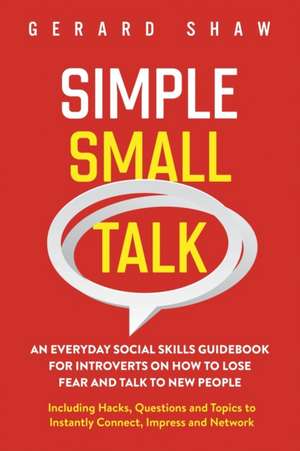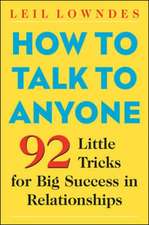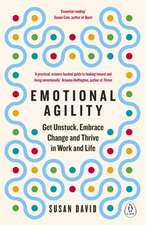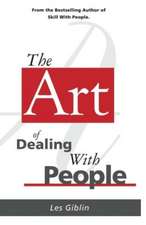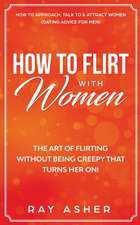Simple Small Talk: An Everyday Social Skills Guidebook for Introverts on How to Lose Fear and Talk to New People. Including Hacks, Questi
Autor Gerard Shawen Limba Engleză Paperback – 5 mar 2020
| Toate formatele și edițiile | Preț | Express |
|---|---|---|
| Paperback (1) | 90.28 lei 3-5 săpt. | |
| LIGHTNING SOURCE INC – 5 mar 2020 | 90.28 lei 3-5 săpt. | |
| Hardback (1) | 159.72 lei 3-5 săpt. | |
| Communication Excellence – 6 mar 2020 | 159.72 lei 3-5 săpt. |
Preț: 90.28 lei
Nou
Puncte Express: 135
Preț estimativ în valută:
17.27€ • 18.08$ • 14.29£
17.27€ • 18.08$ • 14.29£
Carte disponibilă
Livrare economică 15-29 martie
Preluare comenzi: 021 569.72.76
Specificații
ISBN-13: 9781647800468
ISBN-10: 1647800463
Pagini: 154
Dimensiuni: 149 x 228 x 15 mm
Greutate: 0.21 kg
Editura: LIGHTNING SOURCE INC
ISBN-10: 1647800463
Pagini: 154
Dimensiuni: 149 x 228 x 15 mm
Greutate: 0.21 kg
Editura: LIGHTNING SOURCE INC
Notă biografică
"I've heard it countless times when I was a kid and even when I was growing up, ""just smile"". Maybe I heard it more than any of you did, that's because I rarely smile. I'm one of those introverts, and I'm not saying all introverts are as totally clueless as I am when it comes to facial expressions. I was literally bad in all sorts of expression, both body and verbal expression. I was often misunderstood. So, I focused more on expressing myself in other forms of expression which are music, writing, and the arts. It was cool for a while, I enjoyed sharing it with a couple of close friends. I've lived my youth pretty much with ideas, concepts, and imagination in my head. I got brilliant ideas and thought that's enough to get me to college. I nailed writing the application for business school until I was called for an interview. Guess what? It was terrible, and I barely made it through, but somehow I did. I vowed I'd jump into entrepreneurship and put up my own company right after college so I could skip being in that same situation. I hated interviews. I also struggled with presentations back in college, and I'm happy that I often did it with a team. I was always ""the brain"" who's got all the major inputs in terms of conceptualization and ideas. But then somebody had to do the presentation, and I was just happy there's always someone ""gifted"" with that talent in my team to do it for me. I just had to give all the praises people give to that someone, he deserves it. But at the back of my head, ""What do I deserve?"" At some point, right at the culminating part of all our endeavors, we will be faced with our very own reality. Before graduation, I realized it's not okay to be just on the sidelines. It's not okay to let someone do your dream for you. I had to do a final presentation on my own and I knew I had to do it for myself. It felt like a hard battle between what I knew who I am in the inside and the lack of who I am on the outside. I had to take a hard look at myself in the mirror everyday and funny that I needed to tell myself to just smile. I didn't even know that smile, I never even bothered looking at myself with that for a while. I started thinking about what others could be thinking. Being that conscious was hell but truly enlightening. I began studying keynote speakers, what do they have? I've observed the best-talented presenters in class, what keeps their audience engaged in their every move and what they have to say? Soon I found myself attending conventions, business-related, but I was taking serious note of the speakers. Until I found myself a real inspiration who has become one of my mentors. The first thing I did right off college is not to try to escape interviews. In fact, I challenged myself to apply for a PR internship. My writing was a stand out in the field, but it also came with a hard knock on my interpersonal communication skills. You just got to face it. Face your fears and just smile. Today, I'm a keynote speaker myself, a communication coach, and a PR expert to several multinational brands worldwide. I have found my real passion in sharing the message that anyone can do it. Communication is not an innate gift but a skill anyone can learn. The desire to learn to ""be better"" is the one that's inherent in all of us. I'm here to show you the ticket to discovering the world behind that fear by showing you effective ways to communicate even when you're anxious about it. I have faced the same fears in my career and personal life, we all face it maybe just at varying levels. What is important is to be able to prepare yourself to cope in these situations. Maybe you've suffered from a mistake before and you want a different outcome this time. Communication is not a fiend but a friend. If you can work it in your favor, then expect positive outcomes."
